Abstract
OBJECTIVE--To assess the impact of teaching general practitioners to carry out structured assessments of their long term mentally ill patients. DESIGN--Randomised controlled trial. SETTING--Sixteen group general practices in South Thames (west) region. SUBJECTS--440 adults disabled by long term mental illness. INTERVENTIONS--Patients were identified by using practice data with help from local psychiatric and social services. In eight practices the practitioners were taught a structured assessment schedule to use with patients every six months for two years. MAIN OUTCOME MEASURES--Changes in drug treatments, referrals, consultation rates, and recording of preventive health data in the two years after intervention. RESULTS--Follow up data were available on 373 patients (84.7%). At least one structured assessment was recorded for 127 patients in the intervention group but only 29 had four assessments recorded. Participating practitioners considered the structured assessment to be time consuming and reported that it did not often lead directly to changes in treatment or referrals. Changes in treatment with neuroleptic drugs and referrals to community psychiatric nurses, however, were significantly more frequent in the intervention group (differences for intervention group minus control group adjusted for activity in two years before intervention were 14.3% (95% confidence interval 4.3% to 24.33%; P < 0.01) for neuroleptic drugs and 13.3% (2.0% to 24.6%; P < 0.05) for referrals). There were no significant differences in psychiatric admissions, use of the Mental Health Act, drug overdoses, prescriptions, referrals or admissions for physical problems, consultation rates, continuity of care, or recording of preventive data. CONCLUSIONS--Teaching general practitioners about the problems of long term mentally ill patients may increase their involvement in patients' psychiatric care. Regular structured assessments do not seem feasible in routine surgery appointments. More training for general practitioners and increased resources such as more nurse time may be necessary if improvements in care of long term mentally ill patients in general practice are to be generalised.
Full text
PDF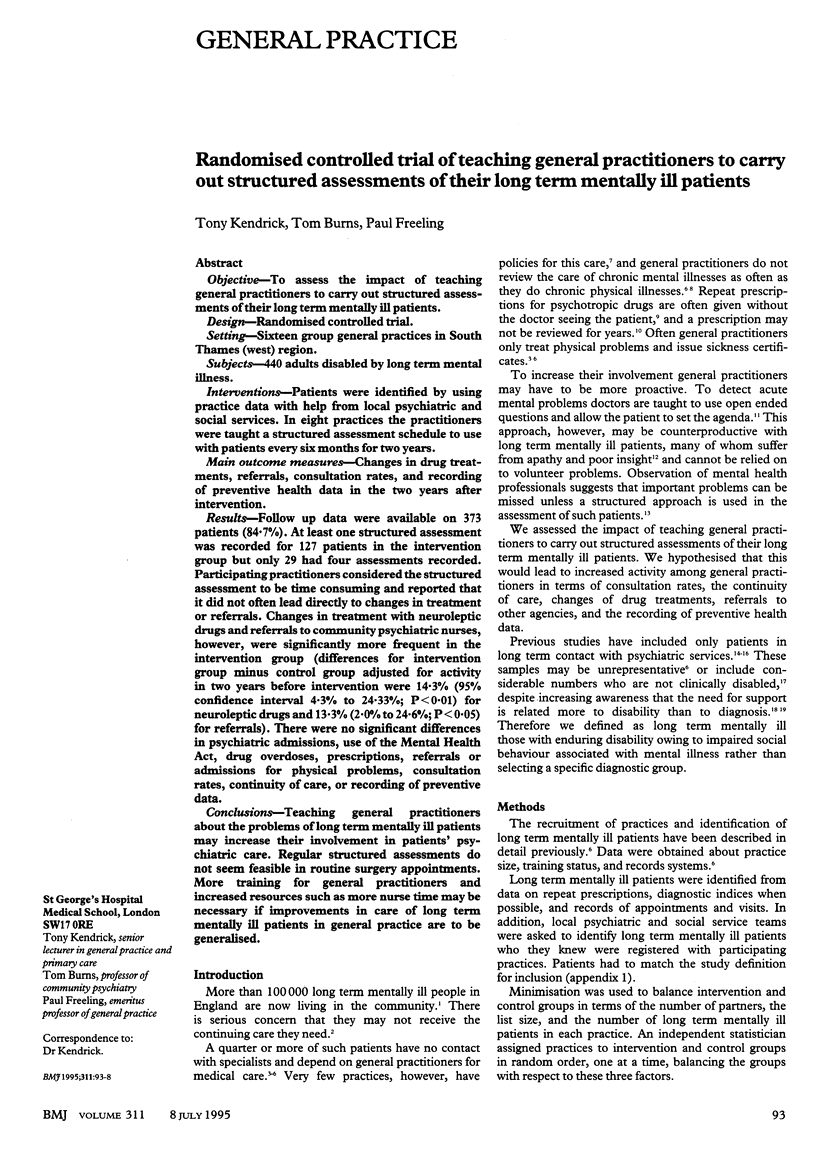
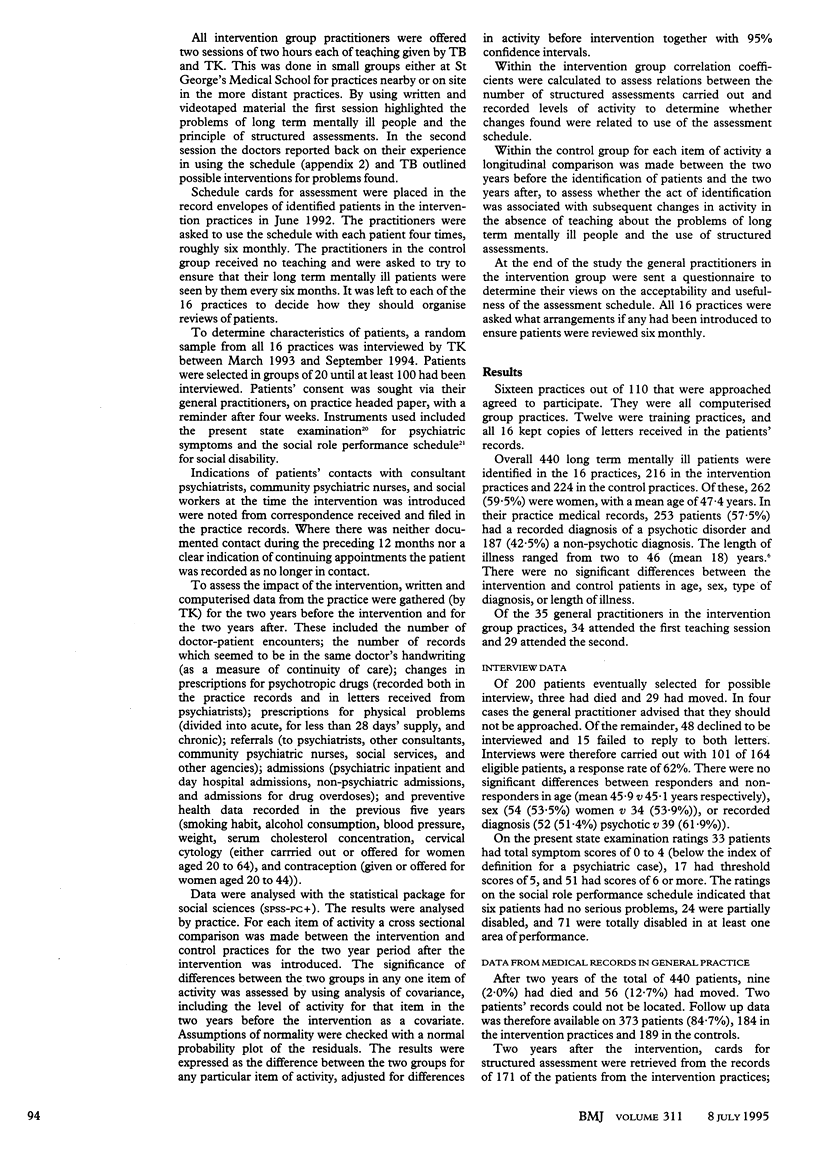
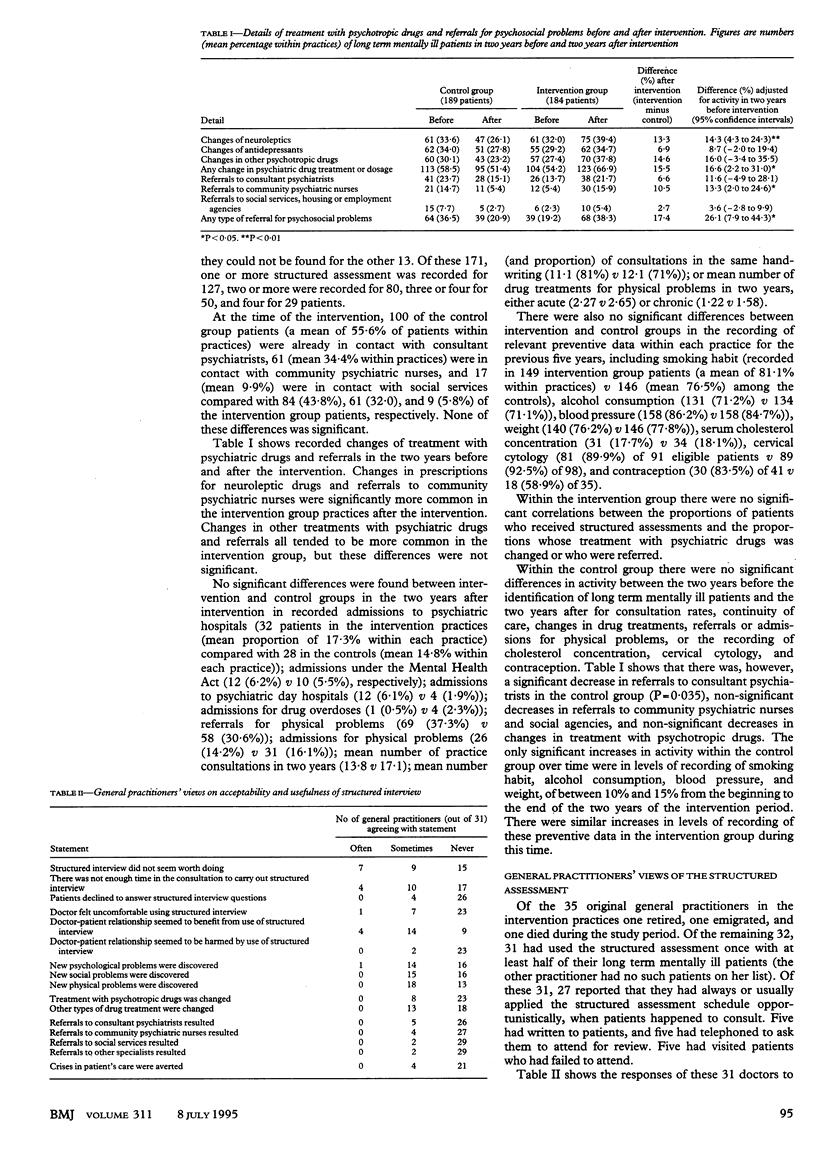
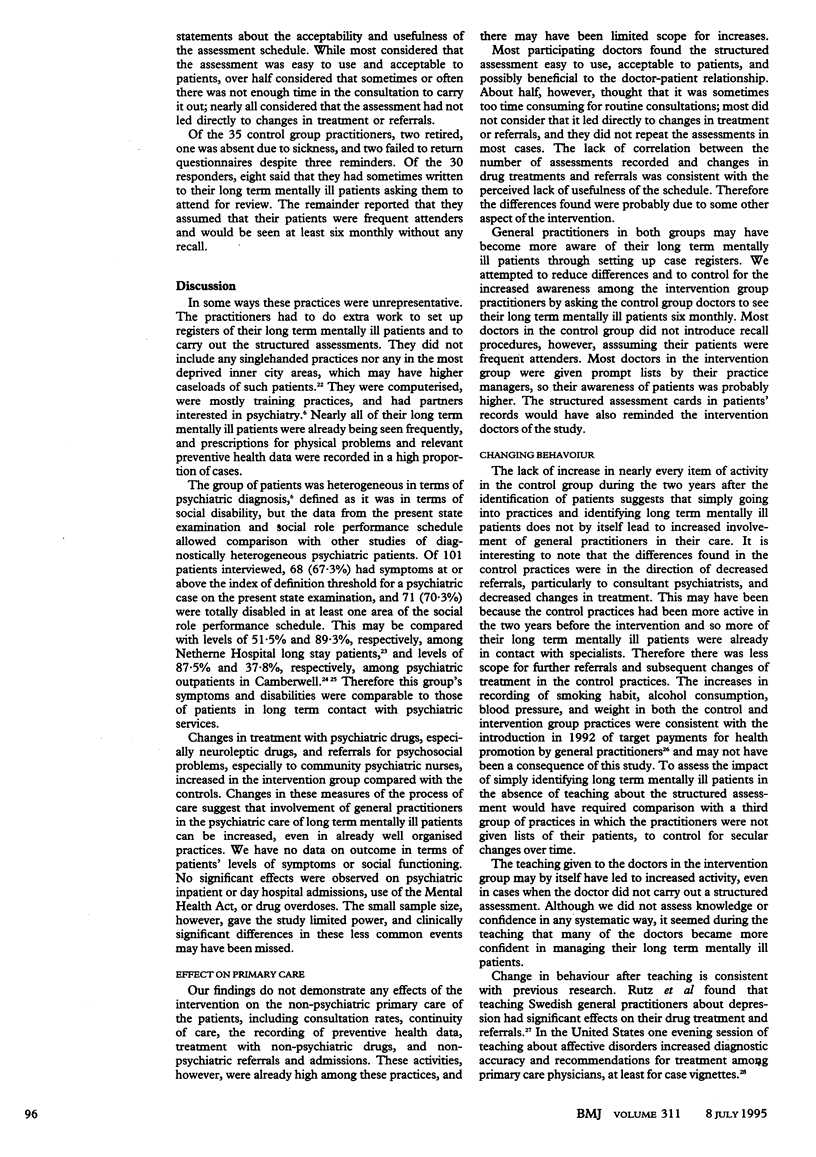
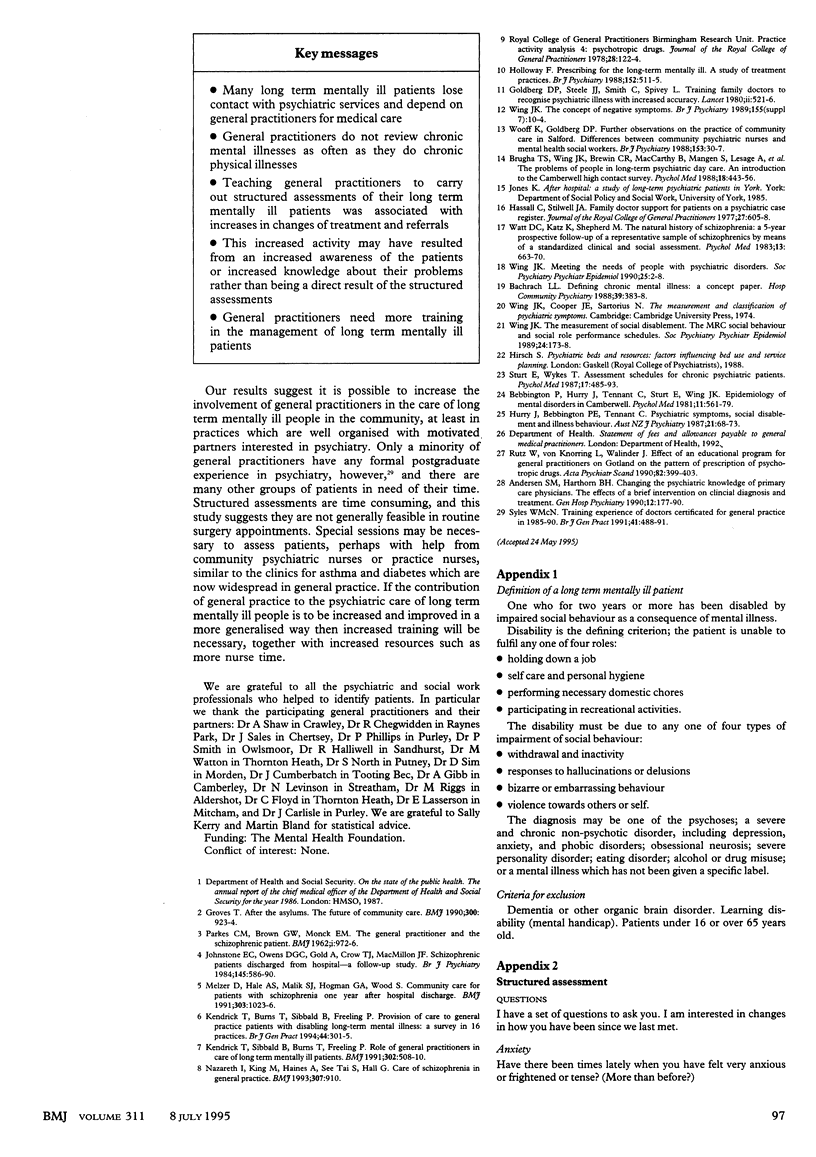
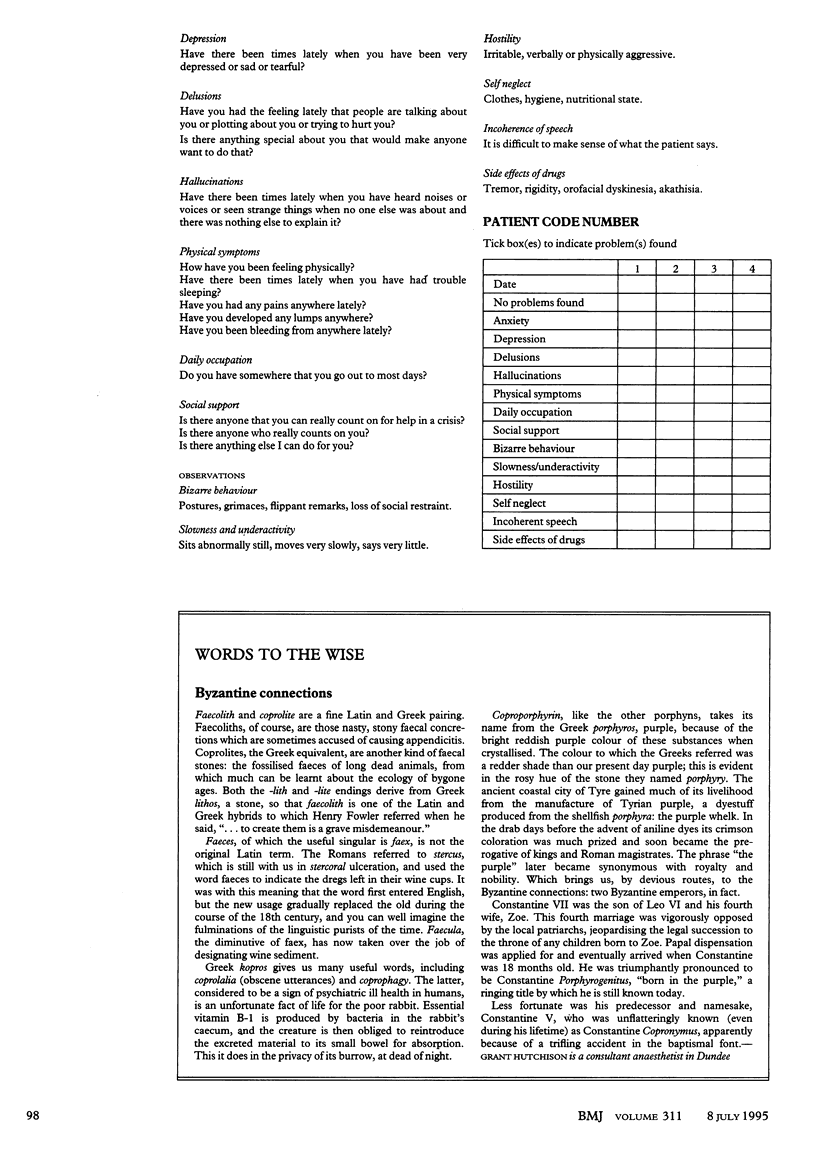
Selected References
These references are in PubMed. This may not be the complete list of references from this article.
- Andersen S. M., Harthorn B. H. Changing the psychiatric knowledge of primary care physicians. The effects of a brief intervention on clinical diagnosis and treatment. Gen Hosp Psychiatry. 1990 May;12(3):177–190. doi: 10.1016/0163-8343(90)90077-p. [DOI] [PubMed] [Google Scholar]
- Bachrach L. L. Defining chronic mental illness: a concept paper. Hosp Community Psychiatry. 1988 Apr;39(4):383–388. doi: 10.1176/ps.39.4.383. [DOI] [PubMed] [Google Scholar]
- Bebbington P., Hurry J., Tennant C., Sturt E., Wing J. K. Epidemiology of mental disorders in Camberwell. Psychol Med. 1981 Aug;11(3):561–579. doi: 10.1017/s0033291700052879. [DOI] [PubMed] [Google Scholar]
- Brugha T. S., Wing J. K., Brewin C. R., MacCarthy B., Mangen S., Lesage A., Mumford J. The problems of people in long-term psychiatric day care. An introduction to the Camberwell High Contact Survey. Psychol Med. 1988 May;18(2):443–456. doi: 10.1017/s0033291700007984. [DOI] [PubMed] [Google Scholar]
- Goldberg D. P., Steele J. J., Smith C., Spivey L. Training family doctors to recognise psychiatric illness with increased accuracy. Lancet. 1980 Sep 6;2(8193):521–523. doi: 10.1016/s0140-6736(80)91843-7. [DOI] [PubMed] [Google Scholar]
- Groves T. The future of community care. BMJ. 1990 Apr 7;300(6729):923–924. doi: 10.1136/bmj.300.6729.923. [DOI] [PMC free article] [PubMed] [Google Scholar]
- Hassall C., Stilwell J. A. Family-doctor support for patients on a psychiatric case register. J R Coll Gen Pract. 1977 Oct;27(183):605–608. [PMC free article] [PubMed] [Google Scholar]
- Holloway F. Prescribing for the long-term mentally ill. A study of treatment practices. Br J Psychiatry. 1988 Apr;152:511–515. doi: 10.1192/bjp.152.4.511. [DOI] [PubMed] [Google Scholar]
- Hurry J., Bebbington P. E., Tennant C. Psychiatric symptoms, social disablement and illness behaviour. Aust N Z J Psychiatry. 1987 Mar;21(1):68–73. doi: 10.3109/00048678709160901. [DOI] [PubMed] [Google Scholar]
- Kendrick T., Burns T., Freeling P., Sibbald B. Provision of care to general practice patients with disabling long-term mental illness: a survey in 16 practices. Br J Gen Pract. 1994 Jul;44(384):301–305. [PMC free article] [PubMed] [Google Scholar]
- Kendrick T., Sibbald B., Burns T., Freeling P. Role of general practitioners in care of long term mentally ill patients. BMJ. 1991 Mar 2;302(6775):508–510. doi: 10.1136/bmj.302.6775.508. [DOI] [PMC free article] [PubMed] [Google Scholar]
- Melzer D., Hale A. S., Malik S. J., Hogman G. A., Wood S. Community care for patients with schizophrenia one year after hospital discharge. BMJ. 1991 Oct 26;303(6809):1023–1026. doi: 10.1136/bmj.303.6809.1023. [DOI] [PMC free article] [PubMed] [Google Scholar]
- Nazareth I., King M., Haines A., Tai S. S., Hall G. Care of schizophrenia in general practice. BMJ. 1993 Oct 9;307(6909):910–910. doi: 10.1136/bmj.307.6909.910. [DOI] [PMC free article] [PubMed] [Google Scholar]
- PARKES C. M., BROWN G. W., MONCK E. M. The general practitioner and the schizophrenic patient. Br Med J. 1962 Apr 7;1(5283):972–976. doi: 10.1136/bmj.1.5283.972. [DOI] [PMC free article] [PubMed] [Google Scholar]
- Rutz W., von Knorring L., Wålinder J., Wistedt B. Effect of an educational program for general practitioners on Gotland on the pattern of prescription of psychotropic drugs. Acta Psychiatr Scand. 1990 Dec;82(6):399–403. doi: 10.1111/j.1600-0447.1990.tb03068.x. [DOI] [PubMed] [Google Scholar]
- Sturt E., Wykes T. Assessment schedules for chronic psychiatric patients. Psychol Med. 1987 May;17(2):485–493. doi: 10.1017/s0033291700025046. [DOI] [PubMed] [Google Scholar]
- Watt D. C., Katz K., Shepherd M. The natural history of schizophrenia: a 5-year prospective follow-up of a representative sample of schizophrenics by means of a standardized clinical and social assessment. Psychol Med. 1983 Aug;13(3):663–670. doi: 10.1017/s0033291700048091. [DOI] [PubMed] [Google Scholar]
- Wing J. K. Meeting the needs of people with psychiatric disorders. Soc Psychiatry Psychiatr Epidemiol. 1990 Jan;25(1):2–8. doi: 10.1007/BF00789064. [DOI] [PubMed] [Google Scholar]
- Wing J. K. The concept of negative symptoms. Br J Psychiatry Suppl. 1989 Nov;(7):10–14. [PubMed] [Google Scholar]
- Wing J. K. The measurement of 'social disablement'. The MRC social behaviour and social role performance schedules. Soc Psychiatry Psychiatr Epidemiol. 1989 Jul;24(4):173–178. doi: 10.1007/BF02351817. [DOI] [PubMed] [Google Scholar]
- Wooff K., Goldberg D. P. Further observations on the practice of community care in Salford. Differences between community psychiatric nurses and mental health social workers. Br J Psychiatry. 1988 Jul;153:30–37. doi: 10.1192/bjp.153.1.30. [DOI] [PubMed] [Google Scholar]



